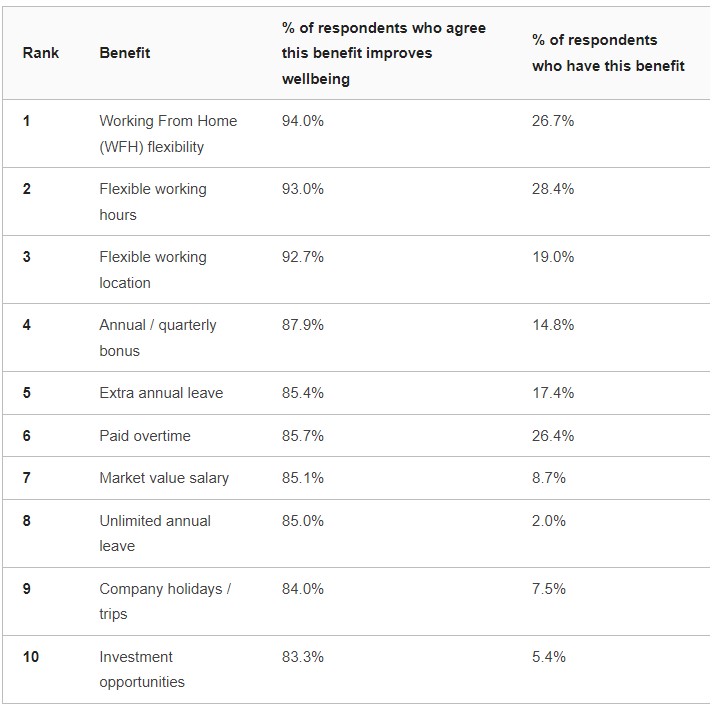
The shift in priorities among UK employees, where flexible working arrangements have surpassed salary as the top workplace benefit, reflects a growing recognition of the importance of work-life balance and overall wellbeing. The survey conducted by Business Name Generator highlights the strong preference for hybrid working, which allows employees to have greater control over their work schedules and workspace.

The popularity of agile work variations, such as flexible office space and the ability to choose one's own hours, further emphasizes the desire for increased autonomy and flexibility in the workplace. This aligns with the findings that flexible working improves staff morale and helps employees better balance their work and personal responsibilities, including childcare.
The fact that big-name employers like Google and Meta are attempting to encourage employees back into the office, despite the high demand for flexible working, suggests that some companies are struggling to adjust to this new trend. The push for in-office attendance might be a response to issues like poor attendance and rising rent payments for office spaces.
For SMEs (Small and Medium-sized Enterprises), the survey results serve as a reminder of the opportunities that a hybrid policy can bring in terms of attracting and retaining talent. As larger companies are grappling with an employee engagement crisis, SMEs have a chance to stand out and appeal to potential employees by offering flexible working arrangements.
In response to the demand for flexible working, the UK government is taking steps to address the issue by proposing the Flexible Working Bill (also known as the Employment Relations Bill). This legislation aims to give employees greater control over their work arrangements by allowing them to request flexible working options, such as remote work, from day one of employment. Employers will have the right to consider and consult with employees on these requests but may still turn them down under certain circumstances.
For SMEs in the UK, the bill is likely to have a significant impact on how they operate, as they will need to be prepared to handle flexible working requests from employees. Understanding common flexible working options and considering how to incorporate them into their business model will be crucial for these companies.
Let's see together pros and cons about working from home VS
Working from Home / Pros:
1. Flexibility: Working from home allows for a more flexible schedule, which can be beneficial for individuals with family responsibilities or personal commitments.
2. Commute Savings: Employees save time and money on commuting, resulting in less stress and a reduced carbon footprint.
3. Comfort: Employees can create a personalized workspace, leading to increased comfort and potentially higher productivity.
4. Reduced Distractions: In some cases, employees can experience fewer distractions from colleagues, office noise, or interruptions.
5. Increased Autonomy: Working from home often gives employees more autonomy and control over their work environment.
Working from Home / Cons:
1. Social Isolation: Working from home can lead to feelings of isolation and loneliness, as there's less face-to-face interaction with colleagues.
2. Communication Challenges: Remote work can sometimes hinder effective communication, leading to misunderstandings or misinterpretations.
3. Work-Life Balance Blur: The line between work and personal life can blur, potentially leading to overworking or difficulty disconnecting.
4. Technology Dependence: Remote work relies heavily on technology, and technical issues can disrupt productivity.
5. Less Collaboration: In some industries or job roles, being physically present in an office environment fosters better collaboration and teamwork.
Working in the Office / Pros:
1. Social Interaction: Working in an office allows for regular face-to-face interaction with colleagues, fostering a sense of camaraderie and teamwork.
2. Improved Communication: In-person communication often leads to clearer and quicker exchanges of ideas and information.
3. Separation of Work and Home: Having a designated workplace outside the home can help maintain a clear boundary between work and personal life.
4. Access to Resources: Office environments typically offer better access to equipment, resources, and facilities needed for work.
5. Enhanced Collaboration: Being physically present enables spontaneous brainstorming sessions and easier collaboration on projects.
Working in the Office / Cons:
1. Commuting: The daily commute can be time-consuming, tiring, and costly for employees.
2. Distractions: Office settings may have more distractions, such as noise, interruptions, or unnecessary meetings.
3. Rigidity: Office hours and routines may offer less flexibility for employees with personal commitments or preferences.
4. Office Politics: Some individuals may find navigating office politics and dynamics challenging.
5. Health Concerns: Office environments can contribute to the spread of illnesses, especially during flu seasons or pandemics.
READ FULL SURVEY